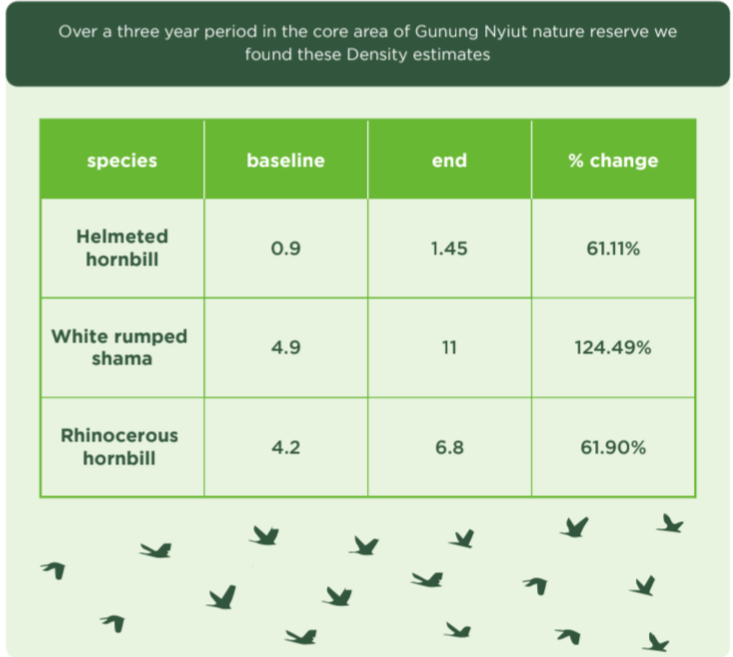Our 2023 Impact Wrapped!
As we bid farewell to another remarkable year, we want to share with you the impact we've made in partnership with the almost 40’000 people we serve and 958,000 ha of rainforest, coastal and marine ecosystems they steward.
This time last year, we unveiled our 5-year strategic plan, and 2023 is the first full year of working under its direction. In the plan, laid out, is our adaptive approach based on four strategic areas that work in harmony together:
It gives us great pleasure to share with you the impact communities of Indonesia in partnership with us at Planet Indonesia have made in these four areas.
33,465 ha have been secured by communities under the Social Forestry Scheme and a further 52,542 ha are in the process.
“In September 2023, the Ministry of Environment and Forests approved our social forestry applications for the three villages in the area. 13,469 ha were approved and granted back under our management. Myself and two other representatives traveled to Jakarta to receive a permit approval letter from the President of Indonesia Joko Widodo himself.” - Village leader of Pantok Village
Using the open-source NusaAnatara Atlas, we analyzed forest loss spanning the 5-year period from 2018 to 2022. This analysis was centered on comparing the extent of forest loss between YPI-affiliated villages (treatment groups) and a comprehensive set of over 2,100 non-affiliated villages (control group) situated within West Kalimantan (fig1).
Fig 1
Fig 2
Subsequently, a detailed examination was conducted, specifically within YPI-affiliated villages (treatment group) that have successfully secured tenurial rights, in comparison with non-affiliated villages (control group) that have similarly secured rights (fig2). This thorough assessment encompassed an analysis of forest loss across an extensive area spanning 14.7 million hectares, approximately 10x larger than the USA’s Yellowstone national park.
The findings are unequivocal. Forest loss within non-YPI-affiliated villages (control sites) was 1.9 times higher than in treatment sites. In areas where communities have secured rights, non-YPI-affiliated villages exhibited a forest loss rate 17.9 times higher.
Notably, it is crucial to emphasize that in regions where rights have been secured (both control and treatment groups), the incidence of forest loss was substantially lower. This robustly reinforces our core value that the tenure of natural resources by local communities is a pivotal stride, advancing the rights of Indigenous Peoples and Local Communities (IPLCs) and significantly amplifying positive environmental outcomes.
Using real-time community-led patrol data over a 70 month period we analysed the change in exploitative activities in core no-take zones and sustainable use zones from over ½ a million hectares.
Results show a significant reduction in illegal farming, hunting, logging, and fishing. This further sheds light on the impact of the approach as it uses real ground data to test behavioral changes in how forest areas are utilized and agreements are complied with. On average, exploitative activities are reduced ~60% within the first three years of partnering with a village.
Fig 3
Fig 4
In 2023 we launched a new ‘governance index’. Together with experts and community partners, we landed on 25 indicators covering different aspects of governance, ranging from transparency to financial capacity, each featuring a straightforward yes/no question, and a description of acceptable supporting evidence. The percentage of indicators achieved translates into a “governance index” that categorizes a community cooperative into four levels, from “basic” to “independent”.
For those who are still wondering what this is all about, let us show you some of the exciting analyses that the Governance Index enables, using the results from a first, desk-based, evaluation of Community Cooperatives across the Gunung Nyiut landscape in 2023. To start, it allows us to evaluate outcomes. Do the Communities we support evolve over time into stronger community governance bodies? With our governance index, it becomes straightforward to test this important assumption. Even though we currently only have scores from one point in time, Figure 1 shows that older cooperatives tend to score higher, which strongly suggests that the governance index improves over time.
Fig 5
Moreover, the Governance Index also helps to evaluate impacts. For example, does improved governance help protect nature? While this is a more complicated question, an initial way of approaching it is by looking at the correlation between Governance Index and deforestation.
For example, we can use data from NusaAntara atlas to look at deforestation as a % of the total forest area in each village. Figure 2 shows that in all villages we work with, forest loss in 2022 was (much) lower than average forest loss over the entire time of the partnership (2017-2022), suggesting that all CCs have been successful at reducing deforestation over time. The trend lines, moreover, suggest that CCs with a higher governance score are also better at preventing deforestation.
Communities invested in and grew in their sustainable, regenerative livelihoods this year more than ever before.
Meet Mrs. Suhaidah, of Sungai Nibung
This year she took out a loan through the Productive Business Fund to run her business, supplying the rural village with essentials.
“Through an injection of funds from my community and support from my family, this business is now my main form of income. Before I was working in the fields as a farmer, but in my age I wanted to do something different, so I set this up and now I can help support my family and with my income I pay for my children to school”.
Planet Indonesia has documented the burden of financial exclusion for communities and its impacts on the environment across nearly all our sites in Indonesia. The debt cycle–conservation nexus is complex and primarily is not addressed in conservation. That is why we have integrated financial resiliency into our community-governance model since the very start of our work. Our founding team had over 25 years of experience working with credit unions, microfinance institutions, and other financial product providers in Indonesia before creating our organization.
Fig 6
Our data shows some really interesting results. First, results from over 400 participants from 30+ focus group discussions across terrestrial and coastal areas linked financial security and inclusion to 14 life-altering outcomes. These spread across the material (e.g. improved security, access to new livelihoods, better access to education) and non-material aspects (e.g. stronger community governance, better life skills of wellbeing as well as environmental outcome (e.g. reduced deforestation, increased wildlife protection.
All these analyses are extremely encouraging. It confirms that we are making a difference, a significant one, to the more than 40’000 people we reach across Indonesia in the most crucial time in our global environmental history. It is clear the work of Planet Indonesia is needed more than ever.
In 2024, we will continue to face new challenges, learn and share more about community-led conservation than ever before, and celebrate hard-fought victories for people and the planet. We are in the best position yet for whatever the year may bring as Planet Indonesia turns 10 years old, with a decade of experience and impact under our cap. Thank you for your support, we are so incredibly grateful to all of you who in whatever way you helped Planet Indonesia and our mission over the year. Your contribution has made a clear impact in the world for the better. We hope you have a very happy new year!
If you have any questions please reach out via admin@planetindonesia.org. Sign up for our newsletter and follow us on our social media Facebook here and Instagram here to get timely updates on our activities, an insider’s look into the lives of front-line conservationists, and ongoing programs.





















